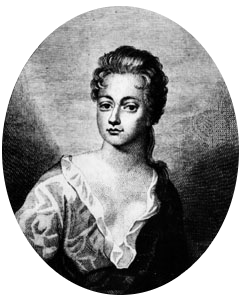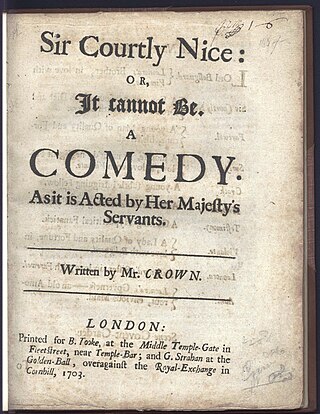Related Research Articles

Anne Bracegirdle was an English actress.

Elizabeth Hartley (1750?–1824) was one of the most celebrated actresses on the London stage in the 18th century. She was also notorious for the role she played in society scandals including "The Vauxhall Affray".

Love for Love is a Restoration comedy written by English playwright William Congreve. It premiered on 30 April 1695 at the Lincoln's Inn Fields Theatre. Staged by Thomas Betterton's company the original cast included Betterton as Valentine, William Smith as Scandal, John Bowman as Tattle, Thomas Doggett as Ben, Samuel Sandford as Foresight, William Bowen as Jeremy, John Freeman as Buckram, Anne Bracegirdle as Angelica, Elizabeth Bowman as Mrs Foresight, Elizabeth Barry as Mrs Frail, Elinor Leigh as Nurse and Abigail Lawson as Jenny.

The Royal Convert is a 1707 tragedy by the British writer Nicholas Rowe. The play is set in England during the Saxon era featuring two brothers in a love triangle with a young Christian woman.
The Innocent Mistress is a comedy written by Mary Pix, first performed in 1697.
George Pack was a British stage actor, singer and theatre manager of the eighteenth century. His first known performance on the London stage was as Westmoreland in Shakespeare's Henry IV at the Lincoln's Inn Fields Theatre and he remained with the company until it transferred to the Queens's Theatre in the Haymarket in 1705. He played in a mixture of comedies and tragedies, originating roles in plays by many of the leading dramatists of the era including Nicholas Rowe, Mary Pix, John Vanbrugh and Susanna Centlivre.

Sir Courtly Nice: Or, It Cannot Be is a 1685 comedy play by the English writer John Crowne. Rehearsals by the United Company were underway when the death of Charles II in February led to the closure of all theatres as a mark of respect. The play was eventually staged on 9 May at the Theatre Royal, Drury Lane. It is the tradition of the Restoration Comedy. A popular hit it became a stock part of the repertoire for more than a century, with Colley Cibber and Anne Oldfield appearing in a celebrated 1709 revival.
The Country Wit is a 1676 comedy play by the English writer John Crowne, part of the tradition of Restoration Comedy. It was first staged at the Dorset Garden Theatre in London by the Duke's Company. The cast included Samuel Sandford as Sir Thomas Rash, Thomas Betterton as Ramble, James Nokes as Sir Mannerly Shallow, Henry Harris as Merry, Cave Underhill as Booby, Matthew Medbourne as Lord Drybone, Anthony Leigh as Rash, Mary Betterton as Lady Faddle, Mary Lee as Christina, Elizabeth Currer as Betty Frisque and Elinor Leigh as Isabella.

Dame Dobson is a 1683 comedy play by the English writer Edward Ravenscroft.
Elizabeth Bowman was an English stage actress of the seventeenth and early eighteenth century. The daughter of Sir Francis Watson, 1st Baronet she was adopted by the actor manager Thomas Betterton. In 1692, she married John Bowman and began acting at Drury Lane the following year as Mrs Bowman. She was a member of the United Company until 1695 then joined Betterton's breakaway at the Lincoln's Inn Fields Theatre.
The Marriage-Hater Matched is a comedy play by the English writer Thomas D'Urfey. It was first staged by the United Company at the Theatre Royal, Drury Lane in January 1692. The original cast included John Bowman as Brainless, William Mountfort as Sir Philip Freewit, Samuel Sandford as Limber, John Hodgson as Darewell, Anthony Leigh as Myn Here Van Grin, George Bright as Bias, Thomas Doggett as Solon, William Bowen as Callow, Colley Cibber as Splutter, Elizabeth Barry as Lady Subtle, Katherine Corey as Lady Bumfiddle, Anne Bracegirdle as Phoebe, Charlotte Butler as La Pupsey and Abigail Lawson as Margery.
Love For Money; Or, The Boarding School is a 1691 comedy play by the English writer Thomas D'Urfey. It was originally staged at the Theatre Royal, Drury Lane by the United Company. In 1733 it was adapted into a ballad opera The Boarding School by Charles Coffey.

The Carless Husband is a comedy play by the English writer Colley Cibber. It premiered at the Theatre Royal, Drury Lane on 7 December 1704. The original cast featured Cibber as Lord Foppington, George Powell as Lord Morelove, Robert Wilks as Sir Charles Easy, Anne Oldfield as Lady Betty Modish, Frances Maria Knight as Lady Easy, Henrietta Moore as Lady Graveairs and Jane Lucas as Mrs Edging. It has been described as Cibber's most successful play, and provided a vehicle for his popular foppish Lord Foppington personae.

The She-Gallants is a 1695 comedy play by the English writer George Granville. It was first staged by Thomas Betterton's Company at the Lincoln's Inn Fields Theatre in London.
Friendship in Fashion is a 1678 comedy play by the English writer Thomas Otway. It was first staged by the Duke's Company at the Dorset Garden Theatre in London. It was part of the trend of Restoration Comedy that flourished during the era.
The English Frier; Or, The Town Sparks, sometimes spelt as The English Friar, is a 1690 comedy play by the English writer John Crowne. It was originally staged by the United Company most likely at the Theatre Royal, Drury Lane, although it may have appeared at the Dorset Garden Theatre, the other venue of the company. Written in context of the recent Glorious Revolution, it attacks Catholic priests who meddle in English politics, undermining the constitution.

The Fortune Hunters; Or, Two Fools Well Met is 1689 comedy play by James Carlile. It was originally staged by the United Company at the Theatre Royal, Drury Lane in London.

Bury Fair is a 1689 comedy play by the English writer Thomas Shadwell. It is part of the tradition of Restoration Comedy that flourished during the era. It was first staged by the United Company at the Theatre Royal, Drury Lane in London.
Mr Turbulent; Or, The Melanchollicks is a 1682 comedy play by an anonymous author. It was originally staged by the Duke's Company at the Dorset Garden Theatre in London.
Jane Lucas was an English stage actress and singer of the late seventeenth and early eighteenth century. From around 1693 she was a member of the United Company based at the Theatre Royal, Drury Lane. In 1697 she had fellow actor Colley Cibber arrested, although the reason was not clear and she remained acting in the company alongside him for some years afterwards.
References
- ↑ Caines p.3
- ↑ Caines p.3
- ↑ Lowerre, Kathryn (5 July 2017). Music and Musicians on the London Stage, 1695-1705. Routledge. p. 56-60. ISBN 978-1-351-55762-7.
- ↑ Van Lennep p.82
